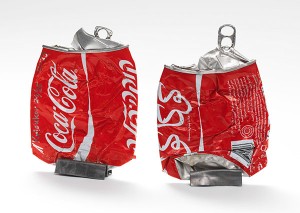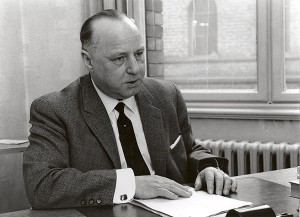A Conversation with Andrei Krioukov

Artistically-treated Coca-cola cans
© Jewish Museum Berlin, photo: Jens Ziehe
As a contribution to our art vending machine, Andrei Krioukov treated and crushed Coca-Cola cans with Hebrew and Arabic labels. I met him and his wife Rita at their art school on Immanuelkirchstraße in Berlin. This is where Andrei teaches international students, who both study and take their state-recognized exams with him.
In our discussion Andrei talks about his fascination with the design of the famous cans and explains the elements of both trash and art they represent.
Christiane Bauer: Andrei, what fascinates you about the Coca-Cola can?
Andrei Krioukov: These cans are typical of our lives today. You can find them everywhere, but hardly anyone notices them. For me, the discrepancy between art and trash is an exciting subject: if a can is lying on the street, it’s trash. But if I pick it up and contemplate it, and I ponder what I can do with it, it turns into art.
An artist from the 19th century could paint garlic, an onion, or a pitcher of water. Today our lives are full of Coca-Cola cans.
The pitcher appeared in still life paintings as an object from everyday life. What significance does the can have? Do you see a can of Coke as a disposable article or as a modern cultural artifact? → continue reading
… the Auschwitz Trial Began 50 Years Ago Today
On 20 December 1963, Federal Germany’s largest and longest-lasting trial to date of crimes committed in National Socialist concentration and extermination camps opened in the council chamber of Frankfurt’s Römer, the city hall. On trial were twenty-two former staff members who had worked between 1941 and 1945 at the Auschwitz concentration camp. The highest-ranking defendant and last commandant of the camp, Richard Baer, had died just before the trial began. Many others did not face charges at all, not least because almost all crimes dating from the Nazi era were already time-barred—even homicide.

Hans Hofmeyer
© Schindler‐Foto‐Report
Since the Federal German legislature had not anchored the Allies’ postwar trials in Federal German law, trial proceedings in Frankfurt am Main—and likewise all subsequent trials of Nazi crimes—were based on the Penal Code of 1871. Consequently the only charges made were those of murder, and of aiding and abetting murder; and the court, under the guidance of the presiding judge Hans Hofmeyer, was accordingly obliged to find whether defendants had been personally involved in acts of murder, that is to say, had broken the law. → continue reading
Food for Thought from Our Recent Conference on “Migration and Integration Policy Today”
In the year 2000, the UN named 18 December International Migrants’ Day. Today, thirteen years later, Germany is well-established as a prime target country for migrants. Its population is plural, multi-religious, and multi-ethnic. Migration and integration therefore provide both politicians and academics considerable scope to tread new ground. But what state is migration and integration policy in today? And what role does academia play in shaping it? Which concepts have become obsolete, and which new perspectives are opening?

Panel discussion at the Academy of the Jewish Museum Berlin
© Jewish Museum Berlin, photo: Ernst Fesseler
On 22 November 2013, experts in migration research engaged in intensive and controversial debate of these questions at a conference jointly convened by the Jewish Museum Berlin, in the framework of its new “Migration and Diversity” program, and by the German “Rat für Migration,” a nationwide network of academics specialized in migration and integration issues. In the subsequent open forum with these invited guests, politics and science met head on: politicians and academics discussed, among others, migration policies proposed by Germany’s recently elected coalition government. → continue reading


